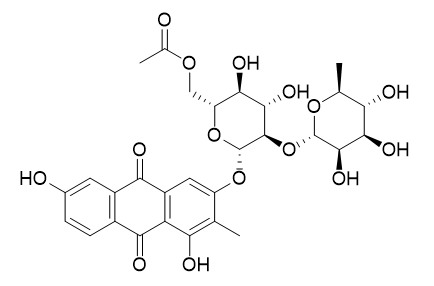1,3,6-Trihydroxy-2-methylanthraquinone 3-O-(6'-O-acetyl)-alpha-L-rhamnosyl-(1->2)-Beta-D-glucoside
1,3,6-Trihydroxy-2-methylanthraquinone 3-O-(6'-O-acetyl)-alpha-L-rhamnosyl-(1->2)-Beta-D-glucoside shows certain antibacterial activity.
Inquire / Order:
manager@chemfaces.com
Technical Inquiries:
service@chemfaces.com
Tel:
+86-27-84237783
Fax:
+86-27-84254680
Address:
1 Building, No. 83, CheCheng Rd., Wuhan Economic and Technological Development Zone, Wuhan, Hubei 430056, PRC
Providing storage is as stated on the product vial and the vial is kept tightly sealed, the product can be stored for up to
24 months(2-8C).
Wherever possible, you should prepare and use solutions on the same day. However, if you need to make up stock solutions in advance, we recommend that you store the solution as aliquots in tightly sealed vials at -20C. Generally, these will be useable for up to two weeks. Before use, and prior to opening the vial we recommend that you allow your product to equilibrate to room temperature for at least 1 hour.
Need more advice on solubility, usage and handling? Please email to: service@chemfaces.com
The packaging of the product may have turned upside down during transportation, resulting in the natural compounds adhering to the neck or cap of the vial. take the vial out of its packaging and gently shake to let the compounds fall to the bottom of the vial. for liquid products, centrifuge at 200-500 RPM to gather the liquid at the bottom of the vial. try to avoid loss or contamination during handling.
Appl. Sci. 2021, 11(23),11099.
J Control Release.2021, 336:159-168.
Pak J Pharm Sci.2019, 32(6):2879-2885
Journal of Ginseng Research2021, 3 June.
Pharmacological Reports2020, 1-9
The Japan Society for Analytical Chemistry2017, 613-617
QASCF2022, 14(4).
Food and Fermentation Industries2018, 44(371)
Int J Mol Sci.2024, 25(17):9730.
Pharmacognosy Journal2019, 11,6:1235-1241
Related and Featured Products
Yao Xue Xue Bao. 1990;25(11):834-9.
Studies on antibacterial constituents from the roots of Rubia cordifolia L.[Pubmed:
2099091]
Twelve compounds were isolated from the roots of Rubia cordifolia L..
METHODS AND RESULTS:
Nine of them were established by chemical and spectroscopic methods to be alizarin (I),1-hydroxy-2-methyl-9,10-anthraquinone(II),1,3,6-trihydroxy-2-methyl- 9,10-anthra-quinone-3-O-(6'-O-acetyl)-alpha-L-rhamnosyl(1--- -2)-beta-D- glucoside[1,3,6-Trihydroxy-2-methylanthraquinone 3-O-(6'-O-acetyl)-alpha-L-rhamnosyl-(1->2)-Beta-D-glucoside, III],1,3,6-trihydroxy-2-methyl-9,10-anthraqueinone-3-O-a lpha- L-rhamnosyl(1----2)-beta-D-glucoside[1,3,6-Trihydroxy-2-methylanthraquinone 3-O-alpha-L-rhamnosyl-(1->2)-beta-D-glucoside
,IV],1,3,6-trihydrozy-2- methyl-9,10- anthraquinone-3-O-(6'-O-acetyl)-beta-D-glucoside(V),2-carbomethyoxy++ +-3-prenyl- 1,4-naphthohydroquinone di-beta-D-glucoside(VI),rubimallin(VII),beta- sitosterol(VIII) and daucosterol(IX), among them, V is a nwe compound and IX was obtained from this genus for the first time, III, VI and VII showed certain antibacterial activities.



